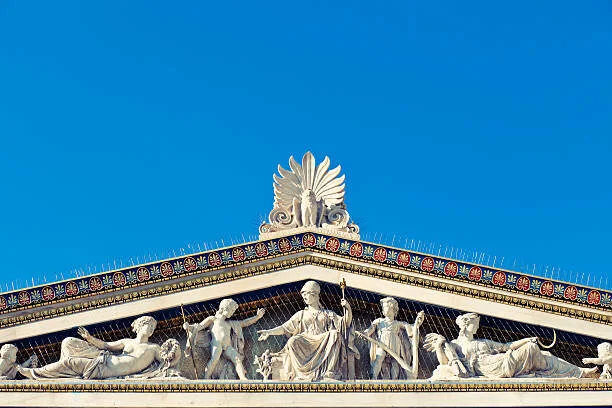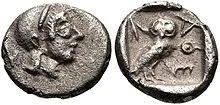The debate over a fair tax system that distributes the burden proportionally among income classes is timeless when it comes to how to tax wealthy citizens.
In ancient Greece, there was moral taxation that motivated the ruling class to seek higher taxes to avoid any suspicion of tax evasion.
That was perhaps the most admirable mechanism of the ancient Greek economy, that taxation was based on those who could actually raise it. And they did it more voluntarily than out of legal obligation, even wanting to cover expenses they weren't even obligated to.
These may all sound like science fiction scenarios, but there was at least one society where taxation was based on people's desire to do their duty to society. And to do so without the intervention of bureaucracy or the law.
In ancient Athens - the idealistic model of the society of the ancient Greeks - income taxation was unknown because it was considered incompatible with the notion of a free citizen: no one could take away what you had earned by your work. Taxes were paid only by settlers and foreigners, never by citizens, since direct taxation was not the appropriate way to distribute part of the wealth of the bourgeoisie to the rest of the world.
This was done with a completely voluntary alternative: "Liturgy"(we translate it as an operation).
A Brief Introduction to the Ancient Greek Economy
"Liturgy" was the name given in ancient Athens to the effort voluntarily undertaken on behalf of the state or wealthy citizens to render a service to the city or the people. It meant something like "public service," a sponsorship of moral and political obligations well entrenched in the Athenian imagination.
Aristotle developed this theme further, for the ideal citizen, saying that he would be one who donated large sums to the community. The true wealth and blessing is in doing good, as he says in his "Rhetoric", giving money and gifts and helping others to continue to exist.
The father of medicine, Hippocrates, believed strongly in the same social responsibility of the wealthy citizen and advised doctors to sometimes render their services free of charge, for sponsorship was to him synonymous with happiness.
The subversive tax system of Athens
When Athens needed improvements in its infrastructure, a new bridge for example, or wanted to hold a glorious ceremony, it invited the aristocrats. Not only did they have to finance the project, but they also had to complete it as contractors, for it was their sole responsibility to oversee the progress of the project and its completion.
The logic here was that, given the unequal distribution of wealth, the rich had to bear the burden of public expenditure. However, the contributions were not required by law, nor did they compel the rich man to do so. All that compelled him was his conscience as a citizen and the tradition he had inherited.
That was the amazing thing about this service, that the motivation was genuine charity, a genuine sense of public duty. It came with high ideals of prize and prestige. If the service was done right, it would elevate the benefactor in the eyes of his fellow citizens.
But there was also an additional personal motivation. In other words: Whereas in the early years of Greek culture only the fearless warriors became heroes, in the golden years of Athens the same status was granted to those who granted Liturgy. For it was probably the same need to protect the fellow citizens that mobilized them.
The result of this clever trick is to forge citizens with the appeal to give much more than what was required of them. Even 3-4 times more! Tax evasion was rejected at the same time with disgust because it meant that you did not want to offer anything to society.
The glorious Panathenaea, for example, was entirely funded by wealthy Athenians, as were the Dionysia. There were sponsorships, funding dance troupes for the feasts, which brought great honor to the rich (even statues were erected in honor of the sponsors), especially if his team won.
"Poikili Stoa" of Athens (Peisianaktios), where the Stoics taught, was the result not only of a Liturgy but also of a public competition for its construction since everyone wanted to associate his name with the great work. Eventually, it became associated with the son-in-law of Kimon, Peisianaktas. But many works of the Acropolis, probably the Parthenon itself, were also financed as part of the Liturgy.
The most brilliant function, however, the one which every self-respecting rich man most wanted, being the most expensive, was none other than the Trireme warship, the obligation to build, equip, and maintain a war trireme. The notoriously strong Athenian fleet had many Liturgies. The man taking care of this service could even take command of the ship in time of war, although the wisest aristocrats left this to the experts.
There is no universal consensus on the number of Athenians that took the responsibility for a Liturgy, but it ranged from 300-1,200, depending on the season and whether it was peacetime, for in war the number of them increased exponentially. And it was they who financed the government spending without paying a single tax to the state.
Despite the voluntary role of the Liturgy, in difficult times the state obliged some to finance projects but never the same person. In times of war, as in the Peloponnese, even every Athenian citizen was obliged to give what he could raise for the military equipment of the city-state.
But there were also crooks who took advantage of the institution of Liturgy for personal political gain. Even Pericles was accused by his enemies of such a thing, that as a young man (before he became a general) he financed the "Persians" of Aeschylus in the Great Dionysia in order to become known as a benefactor. As did his political rival Kimon, who secured the favor of many people.
Liturgy was largely a voluntary service and those who would not do what was due faced public contempt. Conversely, if the citizen did not want to do a service disproportionate to his financial power, that is, he assigned someone richer than him to do it.
Here the law was clear: the second would either finance the project or exchange his property with the first, which in practice proved that he was poorer and therefore unfit to take the Liturgy. This was another clever way of determining a person's true wealth, as opposed to his declared financial situation.
That was the beauty of the system of indirect taxation called "Liturgy", that the upper-income classes shouldered the burdens of the people without anyone asking. Without the involvement of the central administration and the bureaucracy.
And mostly everything went well, because it was not about the money, but about the honor and prestige of the citizen.















